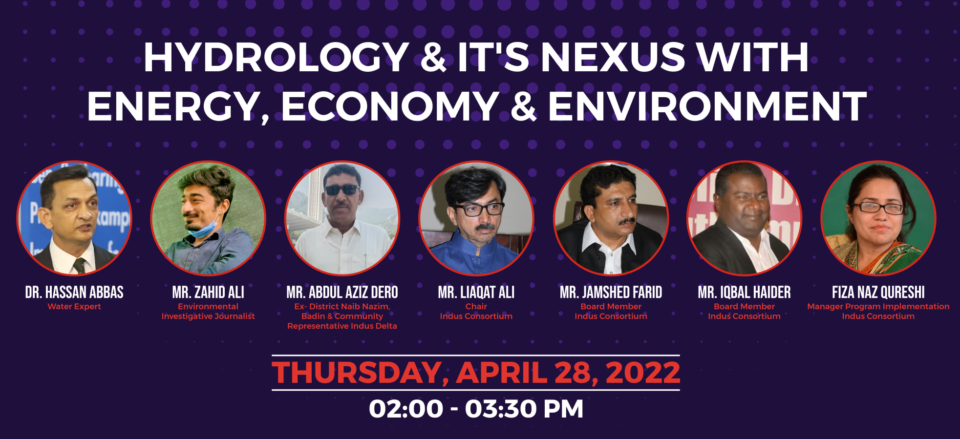By: Sawan Khaskheli
BADIN/ISB: The rapid growth of dams took it in to serious criticism, discussion and debate due to its cost issues, impacts on lower riparian, migration, displacement and environment related issues.
The World Commission on Dams (WCD) process came at a time when dam construction unchecked globally, would routinely see half a million people displaced by dams, often no compensation. WCD process concluded in 2000, included hydro industry, WB, Govts, and society, found that negative impacts of dams nearly universal, and almost unavoidable. 40-80m displaced, benefited rich and poor bear the cost said by Executive Director of International Rivers Network, Josh Klemm in his video message during the webinar on “Hydrology and its nexus with energy, economy and environment” organized by Indus Consortium. He added that The WCD framework covers key areas for improved planning of dams, including the need to fully assess all available options for meeting water and energy needs; addressing outstanding social issues from existing dams before building new ones, gaining public acceptance for key decisions, and the importance of protecting healthy rivers. Unfortunately, many of the key principles still not practiced today, and WCD has unfortunately largely been forgotten or deliberately ignored today.”
It is mostly believed, on the one hand, that large multipurpose dams are the ultimate holy grail of all the problems related to water. But on the other hand, downsides of large dams – their socio-environmental consequences, exuberant costs, long construction time, and destruction of regional ecology, etc., raise many question marks on their feasibility said by Hydrologist and water expert Dr. Hassan Abbas during his presentation on “ alternatives against mega structures for sustainable water and energy solutions -possibilities and opportunities”., he further added that “Dams are touted to enhance water storage, supplement irrigation in dry months, produce hydropower and protect floods. But there many comparable alternates that can be employed to meet the same objectives at lower costs, shorter times and lesser socio-environmental consequences. This talk aims to bring the alternates into discussion.”
Presenting the case study of Neelum- Jhelum hydro power project on “ economic impacts of hydro projects on economy and tax payers”, an investigative journalist Zahid Ali said that “Pakistan’s consistent reliance on Hydro-Powered electricity is not only causing the national exchequer trillion of rupees loss but these projects also require huge amounts of state funding. The Neelum Jhelum hydro-power project is a classic case study in this regard. In this project alone, Pakistan lost 3.43 trillion rupees and its completion took 21 years.”
The Indus River Delta is the fifth biggest delta of the world. Since the 1940s, the delta has received less water as a result of large-scale irrigation works capturing large amounts of the Indus water before it reaches the delta. The result has been catastrophic for both the environment and the local population said by Abdul Aziz Dero, ex- Naib Nazim Badin districts. He expressed his concerns for the degradation of Indus Delta and shared that “The whole area of Indus Delta was a prosperous, which is now the story of the past. Due to acute water shortage in the Indus Delta, Palla fish and red rice are now extinct species. Those who were big landowners are now in debt of millions. On the one hand there is scarcity of water and on the other hand the timber and builder mafia has cut down the mangrove forests and made the whole delta barren.”
While talking on the occasion, Liaqat Ali Chairman Indus Consortium , and Mr. Iqbal Haider and Jamshaid Farid Soomro also shared their views on the occasion and urged the government and major financial institutions that before inception of any mega project , the environmental social governance aspects should be taken care of to ensure sustainable and viable solutions.
Experts and attendees at the webinar demanded to promote environment friendly alternative energy projects instead of large dams and give subsidy on the solar PVs to the common citizens..

